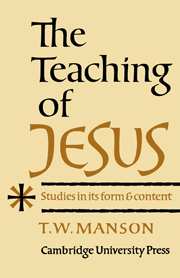Book contents
- Frontmatter
- Contents
- Preface
- LIST OF ABBREVIATIONS
- PART I PRELIMINARY QUESTIONS
- PART II THE CONTENTS OF THE TEACHING
- Chap. IV God as Father
- Chap. V God as King
- Chap. VI God as King: The Eternal Sovereignty
- Chap. VII God as King: The Kingdom in the World
- Detached Note C. The Terms ‘Disciple’ and ‘Apostle’
- Chap. VIII God as King: The Final Consummation
- Chap. IX Religion and Morals
- Detached Note D. On Mk x. 42–44
- Detached Note E. On Mk vii. 6–13
- Appendices I–VI
- Additional Notes
- General Index
- Reference Index
Detached Note E. On Mk vii. 6–13
Published online by Cambridge University Press: 31 March 2010
- Frontmatter
- Contents
- Preface
- LIST OF ABBREVIATIONS
- PART I PRELIMINARY QUESTIONS
- PART II THE CONTENTS OF THE TEACHING
- Chap. IV God as Father
- Chap. V God as King
- Chap. VI God as King: The Eternal Sovereignty
- Chap. VII God as King: The Kingdom in the World
- Detached Note C. The Terms ‘Disciple’ and ‘Apostle’
- Chap. VIII God as King: The Final Consummation
- Chap. IX Religion and Morals
- Detached Note D. On Mk x. 42–44
- Detached Note E. On Mk vii. 6–13
- Appendices I–VI
- Additional Notes
- General Index
- Reference Index
Summary
The severe strictures passed by Jesus on the Scribes and Pharisees in these verses have, not unnaturally, roused Jewish scholars to defend the Rabbinical tradition and Christian scholars to support the attacks made by Jesus. Consequently much has been written and said in a partisan spirit, without a proper regard for the realities of the case.
A vow may be defined as:
A voluntary obligation solemnly assumed towards God to do something not otherwise required, but believed to be acceptable or influential with him. The promise may be either simple or conditional. … Vows of the latter kind were in ancient religions the common accompaniment of prayer and were believed to contribute greatly to its efficacy. … The vow being a solemn promise freely made, was a most binding obligation. … Even a rash vow or one which entailed unforeseen and terrible consequences, like Jephthah's (Judg. xi), must be fulfilled to the letter. … It is no sin not to make a vow, but being voluntarily made it must be fulfilled.
The Pentateuchal laws in Num. xxx and Lev. xxvii. 1–29 deal with details. The former passage determines who can make a binding vow, the latter deals with the conditions under which persons or property vowed to God may be redeemed. These two passages do not, however, affect the main point, which is that the making of vows is not a religious obligation, but the fulfilment of a vow validly made is. This is the position as it is left by the written Law.
- Type
- Chapter
- Information
- Teaching of Jesus , pp. 315 - 319Publisher: Cambridge University PressPrint publication year: 1935

